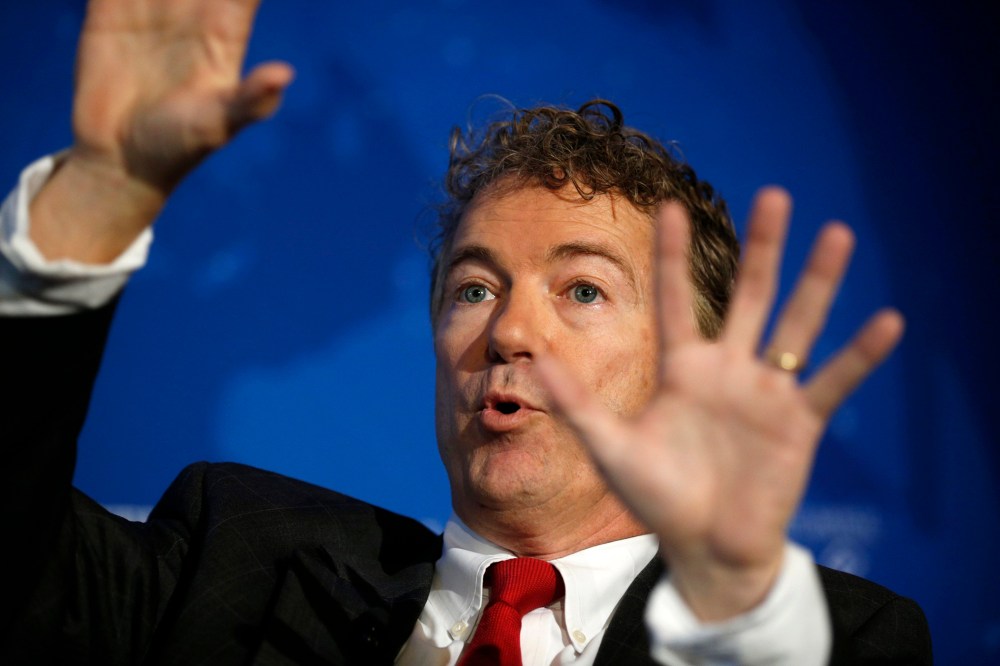Republican Sen. Rand Paul of Kentucky made an eyebrow-raising argument Wednesday evening, blaming cigarette taxes and the politicians who voted in favor of them for the death of Eric Garner, an African-American New Yorker who died in July after a white police officer put him in a chokehold.
Police officers suspected Garner of selling cigarettes illegally in Staten Island, and a grand jury’s decision to not charge the police officer has stoked racial tensions and protests across the country. The demonstrations have been intensified by a separate grand jury decision to not charge another white police officer for the death of unarmed black teen Michael Brown in Ferguson, Missouri.
Paul told msnbc on Wednesday that “it’s hard not to watch that video of [Garner] saying, “’I can’t breathe, I can’t breathe’ and not be horrified by it. But I think there’s something bigger than just the individual circumstances.”

The likely 2016 presidential candidate continued, “I think it’s also important to know that some politician put a tax of $5.85 on a pack of cigarettes, so they’ve driven cigarettes underground by making them so expensive. But then some politician also had to direct the police to say, ‘Hey we want you arresting people for selling a loose cigarette.’ And for someone to die over breaking that law, there really is no excuse for it. But I do blame the politicians. We put the police in a difficult situation with bad laws.”
Critics contend that Paul’s theory is flawed, to say the least. Garner didn’t die as a direct result of the New York Legislature passing a law in 2010 increasing taxes on cigarettes bought in New York City to $5.85 a pack. He died because he was put into a chokehold, a tactic banned by the NYPD in 1994. Even if high taxes on cigarettes create a vibrant black market for cigarettes, critics say that has little to do with how police officers enforce those laws. Hiking taxes on cigarettes and banning the sale of loose cigarettes doesn’t require cops to use lethal force against violators of the law.
And politically, it’s an odd position to take, especially for Paul, who has been courting African-Americans and has made a very clear pitch in tackling racial issues involving the criminal justice system, in additional to visiting historically black colleges.
“He very well may believe the taxes are too high, but the cigarette tax argument seems like small potatoes and a cop out in that he didn’t want to be seen as being too critical of the police, so he chose to focus on this and attack public officials,” said Jeanne Zaino, a professor of political science at Iona College and of political campaign management at New York University. “This could have been the perfect segue for him to talk about what the Republican Party can do to address problems involving race and the criminal justice system.”
%22Paul%20seems%20to%20be%20the%20only%20lawmaker%20focusing%20on%20cigarette%20tax%20increases%20in%20the%20wake%20of%20the%20grand%20jury%E2%80%99s%20decision.%22′
Michael Eric Dyson, a Georgetown University professor and author of “Debating Race,” dismissed Paul’s argument calling it simply a “convenient libertarian subject” for him to discuss and that there is no meaningful relationship between Garner’s death and cigarette taxes. “Even if the taxes were removed completely, black people are going to be subjected to arbitrary expressions of police power and what sometimes feels like police terror,” said Dyson.
Then there’s the entirely separate issue that while conservatives can argue higher cigarette taxes disproportionately hurt the poor, there’s no question that such hikes have been a boon to public health. Studies show that for every 10% increase in the price of cigarettes, consumption goes down about 3%.











